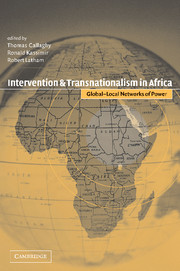Book contents
- Frontmatter
- Contents
- List of contributors
- Preface
- List of abbreviations
- 1 Introduction: transboundary formations, intervention, order, and authority
- Part I Historical dimensions and intellectual context
- 2 Networks, moral discourse, and history
- 3 Authority, intervention, and the outer limits of international relations theory
- Part II Theoretical frameworks
- Part III Transboundary networks, international institutions, states, and civil societies
- Part IV Political economies of violence and authority
- Part V Conclusion
- References
- Index
3 - Authority, intervention, and the outer limits of international relations theory
Published online by Cambridge University Press: 18 December 2009
- Frontmatter
- Contents
- List of contributors
- Preface
- List of abbreviations
- 1 Introduction: transboundary formations, intervention, order, and authority
- Part I Historical dimensions and intellectual context
- 2 Networks, moral discourse, and history
- 3 Authority, intervention, and the outer limits of international relations theory
- Part II Theoretical frameworks
- Part III Transboundary networks, international institutions, states, and civil societies
- Part IV Political economies of violence and authority
- Part V Conclusion
- References
- Index
Summary
The social sciences and the humanities are presently littered with various concepts, phrases, vocabularies, idioms, and slogans that are intended to resituate how scholars think about the “global” and its relationship to a reconceptualized “local.” The utility of these concepts and frameworks is to be found not in their ability to be all things to all scholars, but rather in their capacity to highlight newly emergent structures in global politics, how those structures are created by and are responsible for new networks of actors, and the development of new discourses and practices that collapse and telescope the local and the global. In the search to better understand the relationships between these emergent properties and their relationship to global and local outcomes, there is no substitute for careful, grounded, and historically rich studies. Abstract theorizing and master structural concepts have an important place in theory development and in guiding empirical research, but arguably the best strategy for the purposes of teasing out new insights into global – local relations is one that, following Glaser and Strauss (1967), accepts the methodological value of “grounded theory.” Closely observed and chronicled cases are the media for more generalizable claims.
This volume follows these orthodox admonitions, and, in doing so, arrives at some heterodox observations for theorists of international relations. I have in mind two important and related observations that form the basis of this chapter. The first is the need to move beyond the statist ontology that defines the discipline of international relations.
- Type
- Chapter
- Information
- Intervention and Transnationalism in AfricaGlobal-Local Networks of Power, pp. 47 - 66Publisher: Cambridge University PressPrint publication year: 2001
- 8
- Cited by



